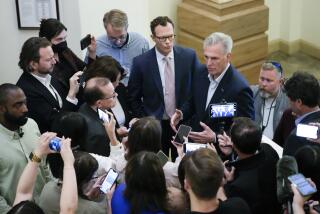Senate Democrats may compromise on public option
- Share via
Reporting from Washington — Racing to complete work on healthcare legislation before Christmas, Senate Democrats worked on a compromise Monday that could leave their bill without a new government insurance plan.
Instead, Democratic lawmakers are exploring an alternative that would authorize the federal government to contract with a commercial insurer to offer benefits to millions of Americans who do not get coverage through employers.
The compromise could include an expansion of Medicare that would allow some Americans as young as 55 to buy into the program, according to lawmakers and others involved in the discussions. That element is an effort to mollify liberals who have demanded that the government set up its own insurance plan, or public option, to compete with private insurers.
Other issues that figure to be part of a final deal include the size of subsidies that the government would offer to low- and middle-income Americans, as well as restrictions on federal funding for abortion. The Senate could vote on an abortion provision as soon as today.
The healthcare overhaul would provide coverage to more than 30 million additional people over the next decade and require nearly everyone to buy insurance or pay a penalty.
But the closed-door negotiations have yet to produce a deal that could unite 60 senators, the number needed to overcome an expected GOP filibuster and ensure passage of the bill. Democrats hold 58 Senate seats, and the chamber’s two independents caucus with them. One Republican, Sen. Olympia J. Snowe of Maine, voted for the bill in committee but cautioned that she might not support it on the floor.
Sen. Ben Nelson (D-Neb.), who has indicated he would not vote for a bill that includes a public option, said Monday that negotiators were “a long way” from a final compromise.
And several leading supporters of a public option -- in the Senate and elsewhere -- reiterated their demands Monday. “Congress must enact a strong public plan if we want to create affordable, accountable coverage options for all Americans,” said Sen. John D. Rockefeller IV (D-W.Va.), who filed an amendment to bolster the version of a public option currently in the Senate bill.
But several liberal and conservative Democrats said Monday that they were optimistic about making progress on the public option, which may be the healthcare debate’s most contentious issue.
“I think most of us -- whether it is all of us is a different story -- are prepared to back off in order to get this bill moving forward,” said Sen. Benjamin L. Cardin of Maryland, a liberal Democrat who has been a strong advocate of creating a new government plan.
Sen. Mark Pryor (D-Ark.), a conservative who is among 10 senators meeting to resolve the issue, said: “We’re a lot closer today than we were a couple days ago.”
House Democrats included a new national government insurance plan in the healthcare bill they passed last month.
Senate Majority Leader Harry Reid (D-Nev.) included a similar provision in the legislation on the Senate floor, but it would give states the right to opt out. Both Senate and House bills would open the new, government-sponsored plan primarily to Americans who do not get insurance through employers.
But conservative Democrats have opposed the plan, forcing Reid to search for an alternative.
The compromise under discussion would allow the federal Office of Personnel Management, which administers health plans for federal employees, to contract with a commercial insurer for a new plan that would be offered to those who do not get insurance at work.
The idea is that with federal oversight on behalf of consumers, the new plan would be more responsive to beneficiaries’ needs than private plans.
At the same time, lawmakers are looking into how to allow Americans ages 55 to 64 to buy into Medicare, which primarily serves people 65 or older.
The Medicare expansion has long been a top priority of groups such as the AARP. It has the backing of many liberal lawmakers, who see it as an extension of the federal government’s most powerful existing public healthcare plan.
But some lawmakers remain wary of the idea.
“What’s that going to do to rates?” asked Sen. Kent Conrad (D-N.D.). “What’s that going to do to Medicare solvency? We’ve got to see answers to all those questions.”
More to Read
Get the L.A. Times Politics newsletter
Deeply reported insights into legislation, politics and policy from Sacramento, Washington and beyond. In your inbox twice per week.
You may occasionally receive promotional content from the Los Angeles Times.










